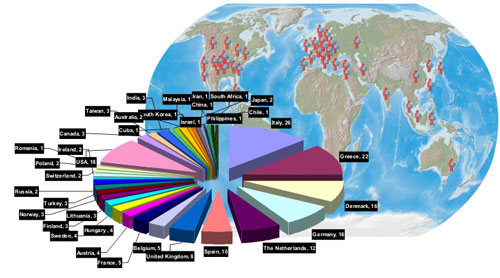|
|||
Second OpenECG Workshopby Catherine Chronaki OpenECG is funded under the 5th framework to promote interoperability in digital electrocardiography through the consistent implementation of standards. OpenECG calls for open protocols and data formats and is driven by patient mobility, continuity of care, and comprehensive electronic health records (EHR). The 2nd OpenECG workshop took place in Berlin, 1-3 April 2004, at DIN, the German institute for standardization. Gerd Herfurth, CEO of DIN-NAMED (Standardisation Committee for Medicine) delivered the welcome address. About 60 experts from Europe, USA, and Japan, attended the workshop. The participants discussed barriers to interoperability and the driving forces towards the adoption of open standards especially with regards to the integration of digital ECGs into the EHR. Prizes for the OpenECG programming contest were awarded. E. Cervesato & G. De Odorico received the first prize (6000 Euro) for an SCP-ECG viewer written in C. The 2nd prize (3000 Euro) was awarded to D. Clunie, for an ECG viewer in Java able to display ECG records in the DICOM and SCP-ECG formats. The recipient of the 3rd prize (1000 Euro), A. Schloegl created in Octave a converter/parser for SCP-ECG records. All submissions are available in open source.
Since July 2002, OpenECG has established an advisory board and the www.openecg.net portal to consolidate best practice in interoperability of ECGs. Conformance testing, a helpdesk, converters, specifications, and tutorials for ECG standards attract people to the portal. A members' mailing list provides a forum for discussion. OpenECG has established a community of more than 200 members and vendors see it as a quality label. The first online service for conformance testing of ECG records to SCP-ECG, the European standard for ECG interoperability, was used more than 280 times by 25 members only in the first six months. Four manufacturers and several integrators have received assistance in implementing the SCP-ECG standard by the OpenECG helpdesk. Dr. Becks from VDE, Germany, identified cardiovascular diseases as the leading cost of death and the most expensive disease in the western world. However, although the ECG is the most frequent non-invasive cardiology examination, its utilisation is limited by closed data formats and non-disclosure of quality characteristics that affect the ability to compare ECGs of the same patient over time (a technique called serial comparison). According to Mr. Rossing, former head of the European Health Telematics program, the eHealth sector in Europe demonstrates tardiness when compared to other sectors. Lack of documented benefits, slow adoption of EHR and limited interoperability are contributing factors. The low cost of ECG recorders has allowed ECG vendors to get away with proprietary protocols and data formats. However, interoperability MANDATES adoption of standards! Dr. Badillini presented developments in USA, where in 2001 FDA demanded full disclosure of waveform data recorded in clinical trials. Specifications, samples, and a viewer are now available for the HL7/FDA Annotated ECG format. Ken Kawamoto and Masaaki Hirai presented a freely available viewer for MFER, a Japanese standard for the storage of waveform data. In Europe, the German IMEX project of VDE is developing MSD, a new micro-system data format (based on SCP-ECG section 1), to address the needs for wearable devices, as reported by Dr. Jettkant. Data format and protocol specifications should be freely available to reduce the cost of integrating medical devices. Integrating legacy ECG devices to EHRs is now costly and requires a non-disclosure agreement. Furthermore, there are no widely adopted data formats for examinations like Holter, stress ECG, and vital signs monitoring. The FEF prestandard as well as successful extensions of SCP-ECG for such examinations were presented by A. Varri, F. Chiarugi, and Chr. Zywietz. The participants recognised SCP-ECG as a data format that addresses resting ECG quality and accuracy, and supports compression that makes it suitable for storage in the European health card (~8kb). Dr. Lymberis commended that despite advances in technology in the eve of the 'Knowledge society,' most ECGs are reported and archived on paper; a limiting factor for broad access to high quality care. Work on standard ECG layouts that look as good on the screen as on paper and consistent terminology are steps towards the acceptance of digital electrocardiography in Europe. Dr. Siebold of Siemens presented the IHE initiative and suggested that OpenECG should collaborate with IHE in cardiology to create added value for the community. The high market penetration of low-cost wearable and portable devices used in personal health management is expected to play a key role in the evolution of eHealth. This tendency pronounces the need for testing of quality and safety issues, an aspect of which is interoperability. OpenECG's envisioned role is to promote interoperability testing, open standards and harmonization of data formats, to reduce the risks involved in the use eHealth. In the long term, establishing consumer confidence will contribute to an increase in market acceptance of eHealth. Link: Please contact: |
|||



